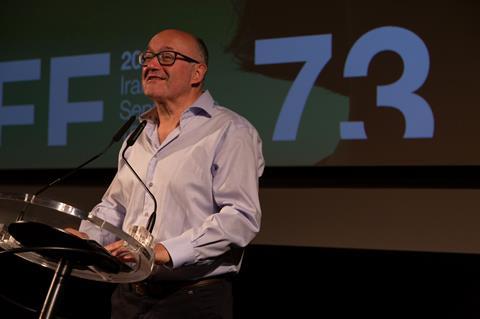
The San Sebastian International Film Festival (SIFF) is opening tonight (September 19) with the world premiere of Daniel Hendler’s 27 Nights.
As he prepares to host his penultimate edition as festival director José Luis Rebordinos talks to Screen about why the festival is embracing political debate, the growing importance of the Creative Investors’ Conference, and his hopes for his succession plans.
The festival director also explains why he believes it was important for the SIFF management commitment to issue a statement strongly condemning the ongoing genocide being inflicted by the Israeli government in Gaza several weeks ago and what he believes to be the role of festivals in politics.
Which films represent what San Sebastian stands for this year?
We always aim to balance the presence of bigger productions such as James Vanderbilt’s Nuremberg and Edward Berger’s Ballad Of A Small Player, with auteur films like Claire Denis’ The Fence, Agnieszka Holland’s Franz and Arnaud Desplechin’s Two Pianos, as well as a strong presence of Spanish and Latin American titles.
There is a lot of diversity in terms of themes and genres because when programming you only think of selecting the best, not in aiming to find common trends. That said, looking at the selection of the whole festival there are quite a lot of films dealing with current political and social issues, starting with Kaouther Ben Hania’s The Voice Of Hind Rajab and Olivier Assayas’ The Wizard Of The Kremlin in Pearls but also with films like Lucrecia Martel’s Landmarks, a critical look at Argentina’s colonial past.
What do you believe makes San Sebastian such a valuable stop off on the festival circuit?
The support to upcoming talents, from the residency programme to the New Directors and Nest sections. Also the fact we are open to a broad non-professional audience which helps to test how films will work. We have a strong industry section despite not aiming to have a market per se. The Spanish language we share with more than 500 million people around the world allows us to be a key gateway for European films to access Latin America and vice versa.
Last but not least, we have our love for film, from the team that organises the festival to the city itself.
On the industry side, the festival is hosting the fourth edition of the Creative Investors’ Conference. What does the conference bring to San Sebastian?
We are extremely pleased with the results. It allows for relevant investors and producers to come to the festival, and this is boosting the whole industry section of San Sebastian as well as offering the opportunity for networking to Spanish industry players. All with the backing of a key company in CAA Media Finance that co-organises the event.
The conference is extremely important to know what the trends are and where the big companies are heading, be it Amazon, Netflix, Mubi. There’s the firm commitment to carry on [with the conference] and I’m convinced it will grow further.
The festival has released a statement condemning the genocide being inflicted by the Israeli government on civilians in Gaza, Why was it important for you to do this?
Everything is politics. Whenever you make a decision you are one way or another involved in politics. The genocide of Palestinians is so brutal we felt the need to state where we stand. We are also screening The Voice Of Hind Rajab which is likely to galvanise the debate about all this. Films give us a chance to reflect on the state of the world. Festivals also give the chance to highlight certain matters, and it’s completely understandable that protests use the spotlight.
How is the festival preparing for possible acts of public protest about the Gaza genocide?
Every year we make adjustments depending on the guests, the year events. But I don’t think this edition is going to be particularly different to other ones.
What is your position on journalists asking political questions of talent at press conferences?
I think it’s perfectly legitimate for journalists to ask political questions respectfully at press conferences about what they think is relevant, and for the talent to answer what they want or not want to reply to. We have to understand that too. I don’t think fingers should be pointed at people who choose not to pronounce themselves.
How do you handle politics in the film selection?
We don’t believe in the exclusion of films because of where they come from. In fact, there is a Russian film in the selection this year [Foreign Lands, by Sergey Borovkov and Anton Yarush]. We don’t choose films depending on their nationality. Of course, we wouldn’t show a film advocating for the genocide in Gaza or the occupation of Ukraine to quote two examples.
Back to happier ground, please tell us about this year’s two Donostia awards
I am delighted to honour El Deseo producer Esther García, the first Donostia Award to not be awarded to a director or to an actor. I admire her. She is a key figure in understanding Pedro Almodóvar’s work and somebody who also has the right sensibility to discover talent in Latin America.
We are also very happy to honour an actress with the huge talent of Jennifer Lawrence, who can reach out to young audiences.
I have never received so many phone calls from teenagers asking what they can do to go and see a film [Die My Love].
Next year will be your last as director of the San Sebastian Film Festival. What are you planning for the transition?
The next director will be appointed by the board of directors. All I have asked for is that the new person is involved from January so we can attend the Berlinale together and I can do the proper introductions in all the following markets. My predecessor, Mikel Olaciregui, did the same for me and it was great.


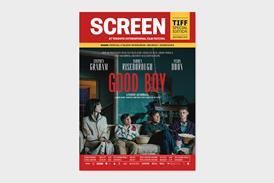

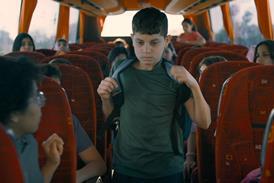

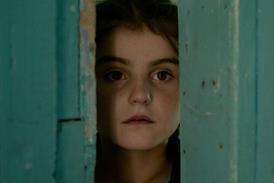


![[Clockwise from top left]: 'The Voice Of Hind Rajab', 'A House Of Dynamite', 'Jay Kelly', 'After The Hunt', 'The Smashing Machine'](https://d1nslcd7m2225b.cloudfront.net/Pictures/274x183/1/7/0/1459170_veniceawards_837515.jpg)






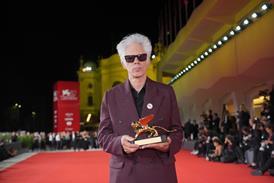
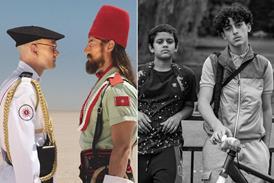







No comments yet